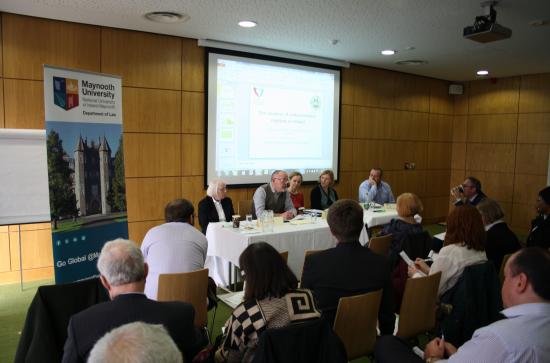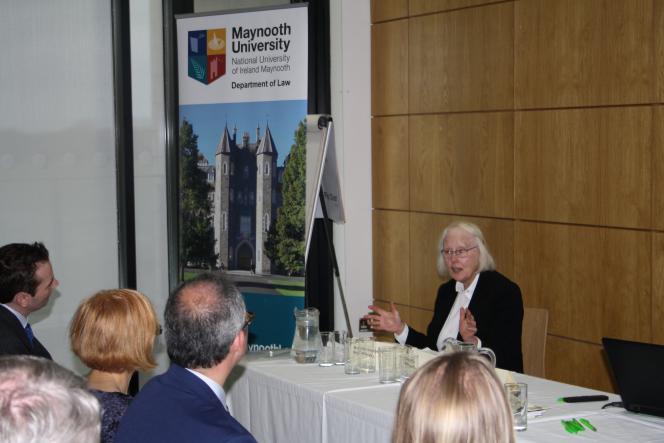
On Friday, 20 November 2015, Maynooth University Department of Law hosted a half-day conference on 'Employment Status and Undeclared Work'. The idea behind the conference was to look at the under-examined issue of undeclared work, with a focus on the case studies of self-employed workers and undocumented migrant workers. The conference was chaired by Ms Justice Laffoy of the Supreme Court.
We welcomed a number of prominent speakers from UK and Irish academia, civil society and government bodies.
Andrea Broughton (Institute of Employment Studies, UK) set the scene for the conference by addressing the question 'What is undeclared work?' She explained that the European Commission defines undeclared work as 'Any paid activities that are lawful as regards their nature but not declared to public authorities'.
The second panel moved to the question of employment status and the key question, 'Who is an employee?' Professor Alan C Neal (University of Warwick, part-time Employment Judge at London Central) criticised the uncertainty which persists in relation to this basic question, particularly given that the status of 'employee' is the gateway to the protections offered by employment law. He suggested that it would be best to start from a presumption that a person is an employee.
Dr Des Ryan (Trinity College Dublin, Barrister) discussed the position in Ireland and the recent case of Minister for Agriculture and Food v Barry and Others [2008] IEHC 216. He said that we still have
'no clarity on the fundamental question of who is an employee' and that this is 'totally unacceptable and a problem for us all'. Ms Justice Laffoy wound up the panel by remarking that there is a key role for academics in pointing out the lacunae in employment law.
The third panel looked specifically at the category of undocumented workers and Professor Sonia McKay (University of West England) opened by sharing her empirical research, in which she found that undocumented workers are vulnerable to exploitation due to their lack of protection under employment law. She suggested that where statutory rights are put in place, such as employment rights, that they should apply to all persons irrespective of status.
Professor Bernard Ryan (University of Leicester) continued by looking at recent case law in the UK in this area, including the Supreme Court decision in Hounga v Allen, in which the Court seemed to identify an exception to the doctrine of illegality, at least in tort claims, in cases of trafficking.
The final panel was a 'roundtable discussion' involving John Kelly (Workplace Relations Commission); Fergus Lowry (ICTU); Rhona Mahony (IBEC); and Helen Lowry (MRCI).
John Kelly noted that the WRC come across the issue of employment status frequently and also actively carry out labour inspections in the 'hidden' economy (eg domestic workers, aspects of the construction and hospitality sectors). Fergus Lowry expressed the view that the State is facilitating bogus self-employment in the construction sector in particular. Rhona Mahony agreed that undeclared work is the 'enemy of the good employer'. She would not be in favour of a statutory presumption of employment status, however. Helen Lowry explained MRCI’s work with undocumented migrants and the challenges that these workers face in realising labour rights. She outlined MRCI’s proposed regularisation programme and noted that they would also favour a firewall between employment and immigration enforcement.
The event was attended by representatives of the Department of Social Protection; the Department of Jobs, Enterprise and Innovation; the Workplace Relations Commission; various trade union and employer organisations; and a number of NGOs; as well as by academics and practising lawyers.

Ms Justice Mary Laffoy acted as chair
